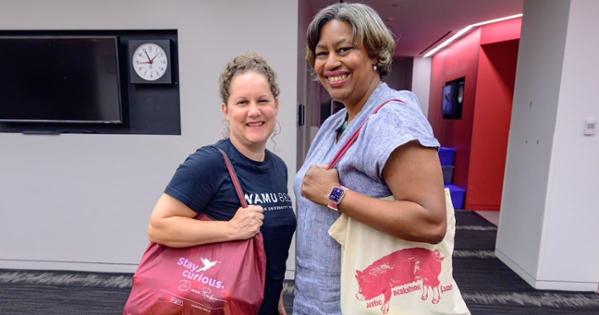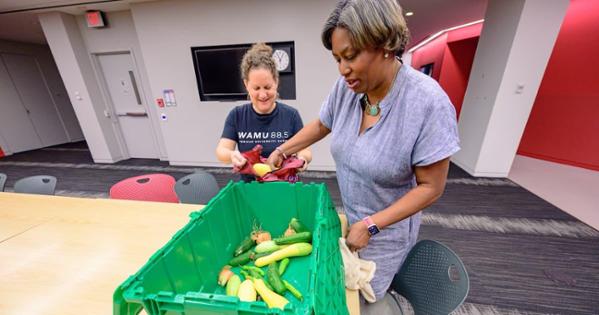Connecting Through Crops

With tote bags in hand, Dawnita Altieri and Allison Kennedy peered into a box of fresh fruits and vegetables and engaged in friendly negotiations about how to split the cornucopia of produce.
“I haven’t had much zucchini at all this summer,” said Kennedy, senior manager of audience engagement for WAMU.
“So, this is perfect,” responded Altieri, WAMU’s chief of staff, handing the green gourds to her colleague in the lower lobby of the NPR’s affiliate’s office at 4401 Connecticut Avenue.
 The 10–12 pounds of fruits and vegetables delivered weekly as part of the Airlie Berkshire Farm community-supported agriculture (CSA) program are more than Altieri and her husband can eat by themselves. To put it all to good use, she began gifting part of her share to a different colleague over each of the CSA’s 15 weeks.
The 10–12 pounds of fruits and vegetables delivered weekly as part of the Airlie Berkshire Farm community-supported agriculture (CSA) program are more than Altieri and her husband can eat by themselves. To put it all to good use, she began gifting part of her share to a different colleague over each of the CSA’s 15 weeks.
“Sharing my bounty with colleagues is a favorite thing to do,” Altieri said. “Being able to share the healthy food motivates me to eat healthy.”
That’s just one example of how the Airlie CSA—launched last year—helps friends, family, colleagues, and neighbors build bonds over fresh food.
“These programs are supposed to be about community,” said Mike Scher, assistant vice president for campus auxiliary services and Airlie. “Food brings people together, and it’s particularly powerful when you’re directly connected to the actual farm.”
Registration for the summer CSA season, which runs from July 31 to September 25, is now underway. Subscribers will receive weekly deliveries of greens, tomatoes, cucumbers, melons, corn, potatoes, and more from the 20-acre farm in Warrenton, Virginia. Subscribers can make five payments of $79, prepay $369, or pay $659 for the summer and fall seasons at a discounted rate. Pickup locations include main campus, WCL, and 4401 Connecticut Avenue.
After pickup, sustainability manager Anna Parse Johnson and her roommate work together to ensure none of their boxes goes to waste. She used the cabbage from a recent delivery to make a big salad for friends; her roommate used the zucchini for another meal. And on a recent weekend when they cooked together, roasted Airlie potatoes rounded out the feast.
“If we can’t think of anything to do with the cucumbers, I’ll pickle them,” Parse Johnson said. “Anything leftover we’ll give to friends and neighbors, and my sister, [who] lives a few blocks away usually ends up with a zucchini or cucumber.”
In the Division of Student Affairs, Dayne Hutchinson, assistant vice president for student engagement and success, asked Jeff Brown, assistant vice president for student affairs and dean of students, if he wanted to split a share.
“It was an easy ‘yes,’” Brown said. “I already knew from others that the produce would be fresh and diverse each week. In my house, we have truly enjoyed the strawberries the broccoli, cauliflower, and especially the most recent addition—the zucchini and other squash.”
Hutchinson said his half of the share has inspired him to do more cooking. The ingredients, he added, often last longer than their grocery store counterparts.
“One of my go-to recipes is sautéed squash, which I make with a few simple ingredients: olive oil, chopped garlic, onions, green onions, cherry tomatoes, thyme, Italian seasoning, salt, pepper, and oregano,” Hutchinson said. “Sautéed for 3–5 minutes, it’s a quick and delicious dish I enjoy every week.”
Edna Pate-Cloutier’s box—which she excitedly anticipates each week—goes a long way toward feeding her family of six.
“I feel like I’m getting my basket of secret ingredients like in the show Chopped,” said Pate-Cloutier, director of planning and project development in the Office of Planning and Project Management. “Then the creative side of me kicks in, and I start to think about new things I can make with my ingredients.”
Her kids, who attended summer cooking camp, have even gotten in on the Food Network-fueled fun. Pate-Cloutier and her helpers have made quiches, mashed and cauliflower rice, zucchini bread, tomatillo salsa, and more using CSA crops.
“They see the produce I get, and they start to tell me what I should make with them,” Pate-Cloutier said. “They know I’m serving farm-to-table meals.”
Learn more and sign up for the CSA program here.
